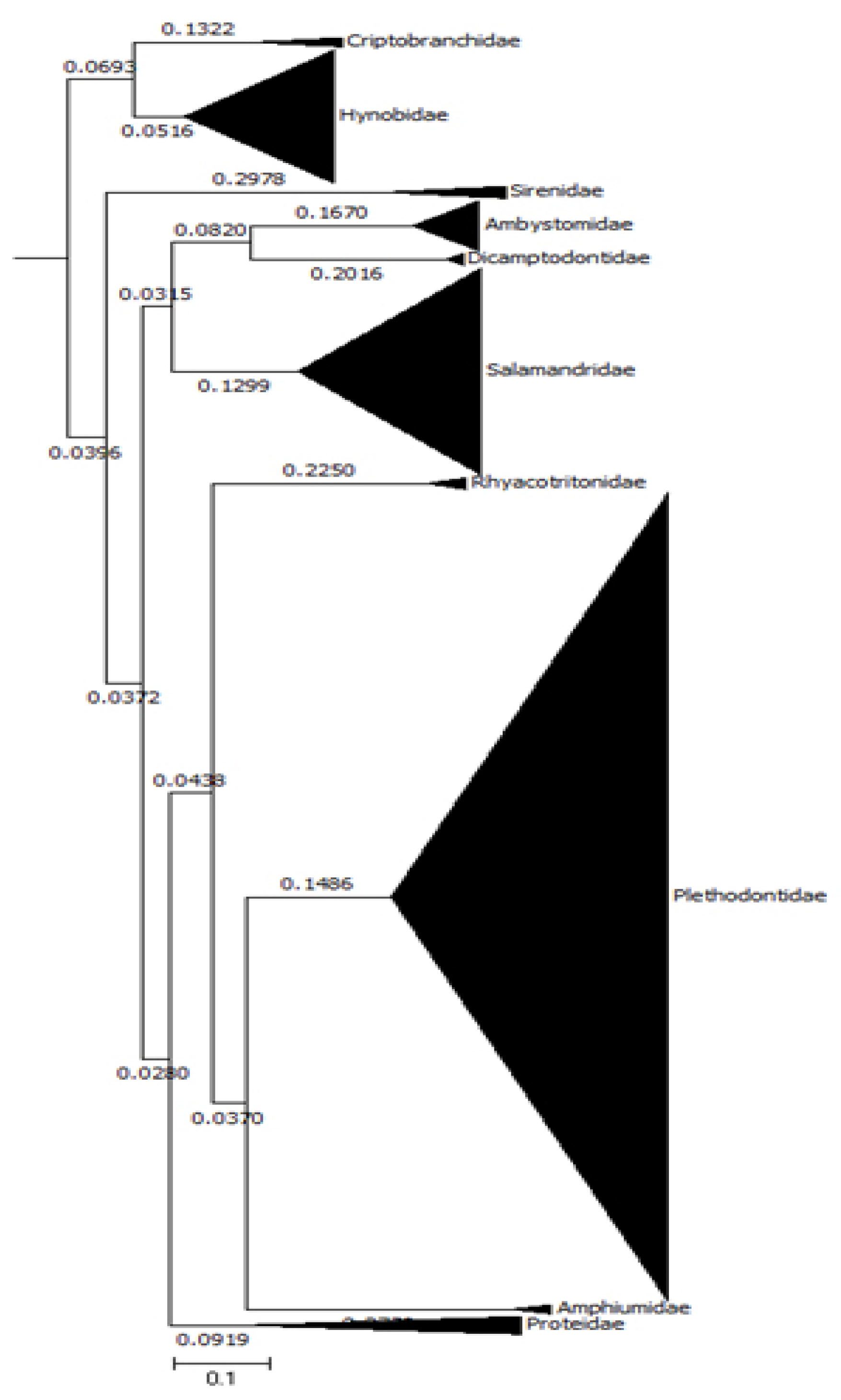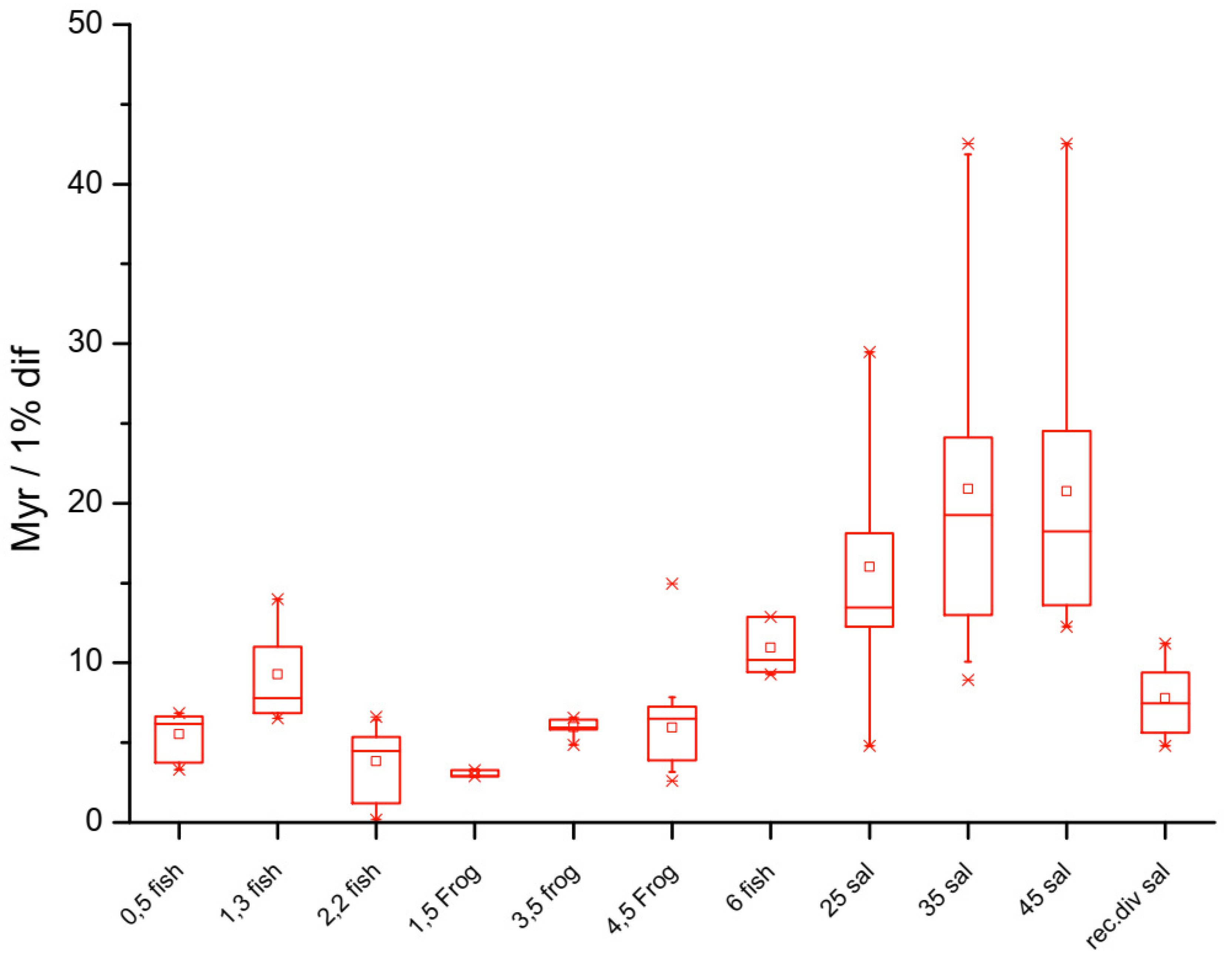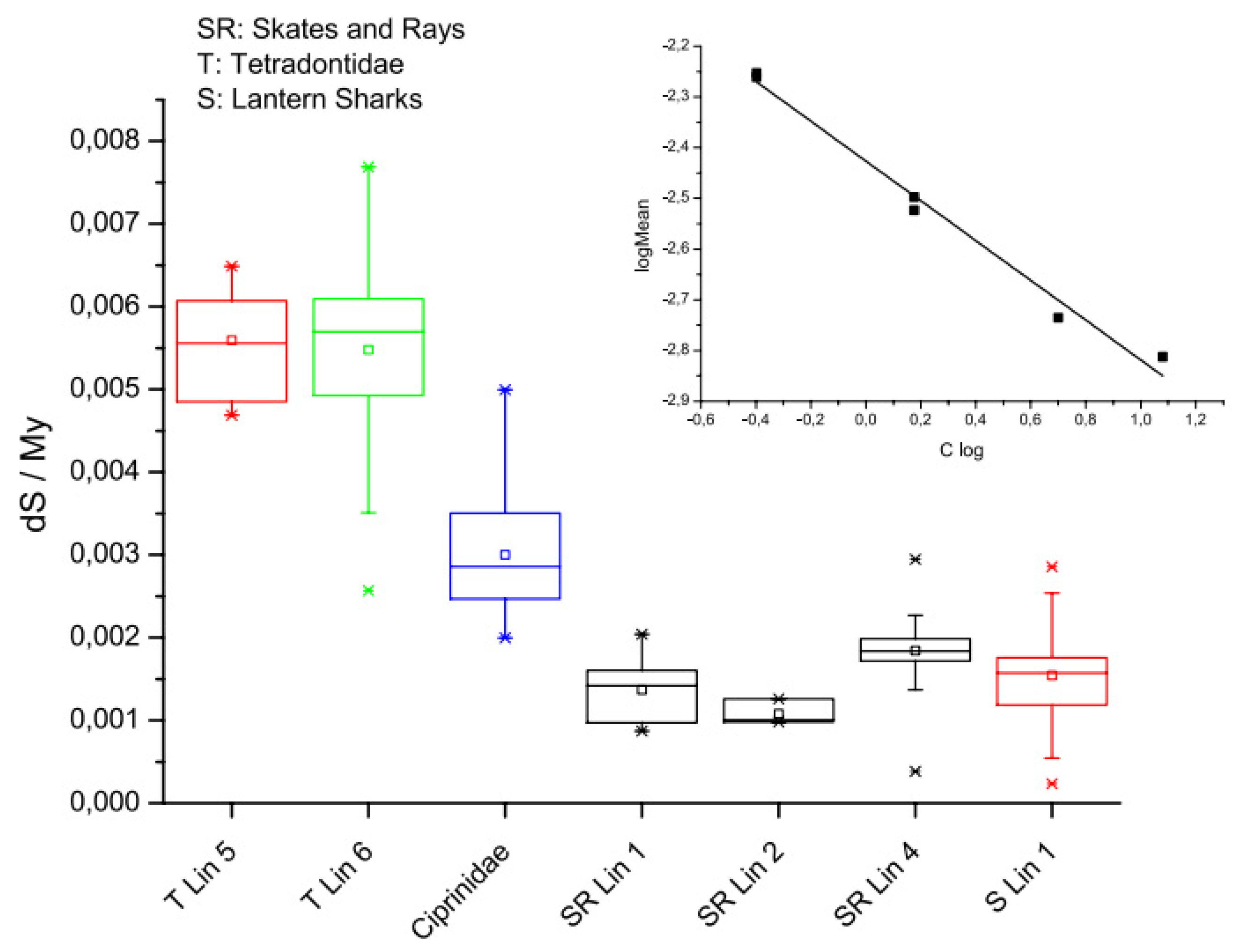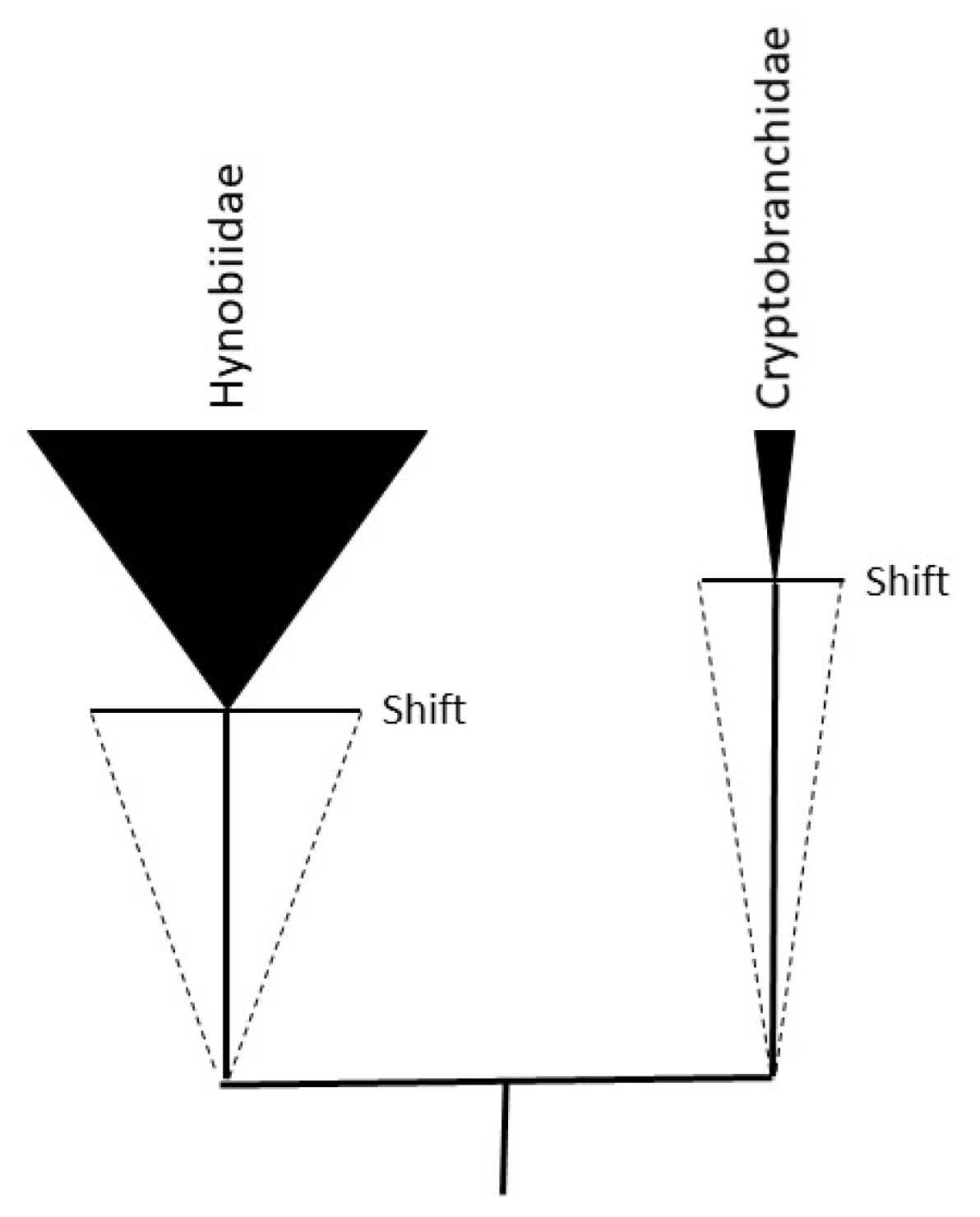Submitted:
17 March 2024
Posted:
18 March 2024
You are already at the latest version
Abstract
Keywords:
1. Introduction: Karyotype Diversity and Species Richness
2. Non-Adaptive Radiation: Ecological Selection vs. Genetic Drift
- 1)
- Relaxation of a selective constraint (a weakened negative, or purifying, selection) resulting in a burst in the number of new gene and genotype variants;
- 2)
- Differential fixation of variants in a population, or subpopulations, under the force of genetic drift;
- 3)
- Rapid habitat-driven diversification into new niches and environments (ecological selection);
- 4)
- Competitive exclusion between related groups leading to extensive adaptive evolution and radically different taxa following successful adaptation to new ecological niches.
3. Genome Stability and Rates of Speciation: Karyotype Diversity Versus Gene Diversity in Determining Species Richness
4. DNA Damage Detection and Repair Systems (DDR) and Chromatin Structure.
5. Limb Regeneration, Cell Differentiation, Development and Aging.
Discussion
Conclusion
References
- Soltis P.S., Folk R.A., Soltis D.E. Darwin review: angiosperm phylogeny and evolutionary radiations. Proc. R. Soc. B.2862019009920190099. [CrossRef]
- Lynch M. Streamlining and simplification of microbial genome architecture. Annu Rev Microbiol. 2006;60:327-49. 10.1146/annurev.micro.60.080805.142300.
- Pellicer J, Hidalgo O, Dodsworth S, Leitch IJ. Genome Size Diversity and Its Impact on the Evolution of Land Plants. Genes (Basel). 2018 Feb 14;9(2):88. [CrossRef]
- Pellicer, J., Fay, M.F., Leitch, I.J. The largest eukaryotic genome of them all?, Botanical Journal of the Linnean Society, Volume 164, Issue 1, September 2010, Pages 10–15, . [CrossRef]
- 5. Alejandro Rodríguez-Gijón, Moritz Buck, Anders F Andersson, Dandan Izabel-Shen, Francisco J A Nascimento, Sarahi L Garcia, Linking prokaryotic genome size variation to metabolic potential and environment, ISME Communications, Volume 3, Issue 1, December 2023, 25, . [CrossRef]
- Hidalgo, O., Pellicer, J., Christenhusz, M., Schneider, A., R. Leitch, A.R., Leitch, I.J. Is There an Upper Limit to Genome Size? Trends in Plant Science, Volume 22, Issue 7, 2017, Pages 567-573.
- Prachumwat A, Li WH. Gene number expansion and contraction in vertebrate genomes with respect to invertebrate genomes. Genome Res. 2008 Feb;18(2):221-32. [CrossRef]
- Demuth JP, Bie TD, Stajich JE, Cristianini N, Hahn MW (2006) The Evolution of Mammalian Gene Families. PLoS ONE 1(1): e85. [CrossRef]
- Damas J, Corbo M, Kim J, Turner-Maier J, Farré M, Larkin DM, Ryder OA, Steiner C, Houck ML, Hall S, Shiue L, Thomas S, Swale T, Daly M, Korlach J, Uliano-Silva M, Mazzoni CJ, Birren BW, Genereux DP, Johnson J, Lindblad-Toh K, Karlsson EK, Nweeia MT, Johnson RN; Zoonomia Consortium; Lewin HA. Evolution of the ancestral mammalian karyotype and syntenic regions. Proc Natl Acad Sci U S A. 2022 Oct 4;119(40):e2209139119. [CrossRef]
- Graphodatsky, A.S., Trifonov, V.A. & Stanyon, R. The genome diversity and karyotype evolution of mammals. Mol Cytogenet 4, 22 (2011). [CrossRef]
- T. RYAN GREGORY, The C-value Enigma in Plants and Animals: A Review of Parallels and an Appeal for Partnership, Annals of Botany, Volume 95, Issue 1, January 2005, Pages 133–146, . [CrossRef]
- Puttick M. N., Clark, J., Donoghue, P. C. J. 2015 Size is not everything: rates of genome size evolution, not C-value, correlate with speciation in angiosperms. Proc. R. Soc. B.2822015228920152289. [CrossRef]
- Voss SR, Kump DK, Putta S, Pauly N, Reynolds A, Henry RJ, Basa S, Walker JA, Smith JJ. Origin of amphibian and avian chromosomes by fission, fusion, and retention of ancestral chromosomes. Genome Res. 2011 Aug;21(8):1306-12. [CrossRef]
- Liu, J., M., Zhou, Q.. Establishment and evolution of heterochromatin. First Published: 04 February 2020, . [CrossRef]
- Kimura M. The neutral theory of molecular evolution: a review of recent evidence. Jpn J Genet. 1991 Aug;66(4):367-86. [CrossRef]
- Schluter D, Conte GL. Genetics and ecological speciation. Proc Natl Acad Sci U S A. 2009 Jun 16;106 Suppl 1(Suppl 1):9955-62. [CrossRef]
- M. Ravinet, R. Faria, R. K. Butlin, J. Galindo, N. Bierne, M. Rafajlović, M. A. F. Noor, B. Mehlig, A. M. Westram, Interpreting the genomic landscape of speciation: a road map for finding barriers to gene flow, Journal of Evolutionary Biology, Volume 30, Issue 8, 1 August 2017, Pages 1450–1477, . [CrossRef]
- The Paradox Behind the Pattern of Rapid Adaptive Radiation: How Can the Speciation Process Sustain Itself Through an Early Burst? Christopher H. Martin and Emilie J. Richards. Annual Review of Ecology, Evolution, and Systematics 2019 50:1, 569-593. [CrossRef]
- 19. Rosemary G Gillespie, Gordon M Bennett, Luc De Meester, Jeffrey L Feder, Robert C Fleischer, Luke J Harmon, Andrew P Hendry, Matthew L Knope, James Mallet, Christopher Martin, Christine E Parent, Austin H Patton, Karin S Pfennig, Daniel Rubinoff, Dolph Schluter, Ole Seehausen, Kerry L Shaw, Elizabeth Stacy, Martin Stervander, James T Stroud, Catherine Wagner, Guinevere O U Wogan, Comparing Adaptive Radiations Across Space, Time, and Taxa, Journal of Heredity, Volume 111, Issue 1, January 2020, Pages 1–20, . [CrossRef]
- Czekanski-Moir JE, Rundell RJ. The Ecology of Nonecological Speciation and Nonadaptive Radiations. Trends Ecol Evol. 2019 May;34(5):400-415. [CrossRef]
- The Next Generation of Adaptive Radiation Studies in Plants John J. Schenk. International Journal of Plant Sciences 2021 182:4, 245-262.
- Kozak K. H., Weisrock D. W., Larson A. 2006Rapid lineage accumulation in a non-adaptive radiation: phylogenetic analysis of diversification rates in eastern North American woodland salamanders (Plethodontidae: Plethodon) Proc. R. Soc. B. 273, 539–546. [CrossRef]
- Joel O. Wertheim, Ben Murrell, Martin D. Smith, Sergei L. Kosakovsky Pond, Konrad Scheffler, RELAX: Detecting Relaxed Selection in a Phylogenetic Framework, Molecular Biology and Evolution, Volume 32, Issue 3, March 2015, Pages 820–832, . [CrossRef]
- Hunt BG, Ometto L, Wurm Y, Shoemaker D, Yi SV, Keller L, Goodisman MA. Relaxed selection is a precursor to the evolution of phenotypic plasticity. Proc Natl Acad Sci U S A. 2011 Sep 20;108(38):15936-41. [CrossRef]
- Persi, E., Wolf, Y., Koonin, E. Positive and strongly relaxed purifying selection drive the evolution of repeats in proteins. Nat Commun 7, 13570 (2016). [CrossRef]
- Lynch M, Conery JS. The origins of genome complexity. Science. 2003 Nov 21;302(5649):1401-4. [CrossRef]
- Fuselli S, Greco S, Biello R, Palmitessa S, Lago M, Meneghetti C, McDougall C, Trucchi E, Rota Stabelli O, Biscotti AM, Schmidt DJ, Roberts DT, Espinoza T, Hughes JM, Ometto L, Gerdol M, Bertorelle G. Relaxation of Natural Selection in the Evolution of the Giant Lungfish Genomes. Mol Biol Evol. 2023 Sep 1;40(9):msad193. [CrossRef]
- Mohlhenrich ER, Mueller RL. Genetic drift and mutational hazard in the evolution of salamander genomic gigantism. Evolution. 2016 Dec;70(12):2865-2878. [CrossRef]
- Ai B, Wang ZS, Ge S. Genome size is not correlated with effective population size in the Oryza species. Evolution. 2012 Oct;66(10):3302-10. [CrossRef]
- Whitney KD, Baack EJ, Hamrick JL, Godt MJ, Barringer BC, Bennett MD, Eckert CG, Goodwillie C, Kalisz S, Leitch IJ, Ross-Ibarra J. A role for nonadaptive processes in plant genome size evolution? Evolution. 2010 Jul;64(7):2097-109. [CrossRef]
- Blommaert J. Genome size evolution: towards new model systems for old questions. Proc Biol Sci. 2020 Aug 26;287(1933):20201441. [CrossRef]
- Bourgeois, Yann, and Stéphane Boissinot. 2019. “On the Population Dynamics of Junk: A Review on the Population Genomics of Transposable Elements” Genes 10, no. 6: 419. [CrossRef]
- Llaurens V, Whibley A, Joron M. Genetic architecture and balancing selection: the life and death of differentiated variants. Mol Ecol. 2017 May;26(9):2430-2448. [CrossRef]
- Ding, G., Hasselmann, M., Huang, J. et al. Global allele polymorphism indicates a high rate of allele genesis at a locus under balancing selection. Heredity 126, 163–177 (2021). [CrossRef]
- Avise JC. Genic heterozygosity and rate of speciation. Paleobiology. 1977; 3(4):422-432. [CrossRef]
- Charlesworth D. Balancing selection and its effects on sequences in nearby genome regions. PLoS Genet. 2006 Apr;2(4):e64. [CrossRef]
- 37. Bárbara D Bitarello, Débora Y C Brandt, Diogo Meyer, Aida M Andrés, Inferring Balancing Selection From Genome-Scale Data, Genome Biology and Evolution, Volume 15, Issue 3, March 2023, evad032, . [CrossRef]
- Harvey MG, Seeholzer GF, Smith BT, Rabosky DL, Cuervo AM, Brumfield RT. Positive association between population genetic differentiation and speciation rates in New World birds. Proc Natl Acad Sci U S A. 2017 Jun 13;114(24):6328-6333. [CrossRef]
- Mani GS, Clarke BC. Mutational order: a major stochastic process in evolution. Proc R Soc Lond B Biol Sci. 1990 May 22;240(1297):29-37. [CrossRef]
- Uyeda JC, Hansen TF, Arnold SJ, Pienaar J. The million-year wait for macroevolutionary bursts. Proc Natl Acad Sci U S A. 2011 Sep 20;108(38):15908-13. [CrossRef]
- Folk RA, Stubbs RL, Mort ME, Cellinese N, Allen JM, Soltis PS, Soltis DE, Guralnick RP. Rates of niche and phenotype evolution lag behind diversification in a temperate radiation. Proc Natl Acad Sci U S A. 2019 May 28; 116(22):10874-10882. [CrossRef]
- Aguilée R, Gascuel F, Lambert A, Ferriere R. Clade diversification dynamics and the biotic and abiotic controls of speciation and extinction rates. Nat Commun. 2018 Aug 1;9(1):3013. [CrossRef]
- Rezazadegan, R., Reidys, C. Degeneracy and genetic assimilation in RNA evolution. BMC Bioinformatics 19, 543 (2018). [CrossRef]
- Mohanty V, Greenbury SF, Sarkany T, Narayanan S, Dingle K, Ahnert SE, Louis AA. Maximum mutational robustness in genotype-phenotype maps follows a self-similar blancmange-like curve. J R Soc Interface. 2023 Jul;20(204):20230169. [CrossRef]
- Manrubia S, Cuesta JA, Aguirre J, Ahnert SE, Altenberg L, Cano AV, Catalán P, Diaz-Uriarte R, Elena SF, García-Martín JA, Hogeweg P, Khatri BS, Krug J, Louis AA, Martin NS, Payne JL, Tarnowski MJ, Weiß M. From genotypes to organisms: State-of-the-art and perspectives of a cornerstone in evolutionary dynamics. Phys Life Rev. 2021 Sep;38:55-106. [CrossRef]
- Whitacre JM, Atamas SP. Degeneracy allows for both apparent homogeneity and diversification in populations. Biosystems. 2012 Oct;110(1):34-42. [CrossRef]
- Paaby AB, Rockman MV. Cryptic genetic variation: evolution’s hidden substrate. Nat Rev Genet. 2014 Apr;15(4):247-58. [CrossRef]
- Wideman JG, Novick A, Muñoz-Gómez SA, Doolittle WF. Neutral evolution of cellular phenotypes. Curr Opin Genet Dev. 2019 Oct;58-59:87-94. [CrossRef]
- Ryszard Maleszka, Paul H. Mason, Andrew B. Barron, Epigenomics and the concept of degeneracy in biological systems, Briefings in Functional Genomics, Volume 13, Issue 3, May 2014, Pages 191-202, . [CrossRef]
- Milosavljevic A. Emerging patterns of epigenomic variation. Trends Genet. 2011 Jun;27(6):242-50. [CrossRef]
- Bertucci-Richter, E.M., Parrott, B.B. The rate of epigenetic drift scales with maximum lifespan across mammals. Nat Commun 14, 7731 (2023). [CrossRef]
- Charlesworth D, Barton NH, Charlesworth B. The sources of adaptive variation. Proc Biol Sci. 2017 May 31;284(1855):20162864. [CrossRef]
- Afanasyeva A, Bockwoldt M, Cooney CR, Heiland I, Gossmann TI. Human long intrinsically disordered protein regions are frequent targets of positive selection. Genome Res. 2018 Jul;28(7):975-982. [CrossRef]
- Wilson AC, Sarich VM, Maxson LR. The importance of gene rearrangement in evolution: evidence from studies on rates of chromosomal, protein, and anatomical evolution. Proc Natl Acad Sci U S A. 1974 Aug; 71(8):3028-30. [CrossRef]
- Bush GL, Case SM, Wilson AC, Patton JL. Rapid speciation and chromosomal evolution in mammals. Proc Natl Acad Sci U S A. 1977 Sep;74(9):3942-6. [CrossRef]
- Maxson LER, Wilson AC. RATES OF MOLECULAR AND CHROMOSOMAL EVOLUTION IN SALAMANDERS. Evolution. 1979 Jun; 33(2):734-740. [CrossRef]
- Coyne, J.A. Correlation between Heterozygosity and Rate of Chromosome Evolution in Animals. The American Naturalist 1984 123:5, 725-729.
- Lynch M, Ali F, Lin T, Wang Y, Ni J, Long H. The divergence of mutation rates and spectra across the Tree of Life. EMBO Rep. 2023 Oct 9; 24(10):e57561. [CrossRef]
- 59. Adam B Roddy, David Alvarez-Ponce, Scott W Roy, Mammals with Small Populations Do Not Exhibit Larger Genomes, Molecular Biology and Evolution, Volume 38, Issue 9, September 2021, Pages 3737–3741, . [CrossRef]
- Amanda R. De La Torre, Zhen Li, Yves Van de Peer, Pär K. Ingvarsson, Contrasting Rates of Molecular Evolution and Patterns of Selection among Gymnosperms and Flowering Plants, Molecular Biology and Evolution, Volume 34, Issue 6, June 2017, Pages 1363–1377, . [CrossRef]
- Bengtsson BO. Rates of karyotype evolution in placental mammals. Hereditas. 1980;92(1):37-47. [CrossRef]
- Schoch RR, Werneburg R, Voigt S. A Triassic stem-salamander from Kyrgyzstan and the origin of salamanders. Proc Natl Acad Sci U S A. 2020 May 26;117(21):11584-11588. [CrossRef]
- Portik DM, Streicher JW, Wiens JJ. Frog phylogeny: A time-calibrated, species-level tree based on hundreds of loci and 5,242 species. Mol Phylogenet Evol. 2023 Nov;188:107907. [CrossRef]
- Hunter P. The rise of the mammals: Fossil discoveries combined with dating advances give insight into the great mammal expansion. EMBO Rep. 2020 Nov 5;21(11):e51617. [CrossRef]
- Bredeson, J.V., Mudd, A.B., Medina-Ruiz, S. et al. Conserved chromatin and repetitive patterns reveal slow genome evolution in frogs. Nat Commun 15, 579 (2024). [CrossRef]
- Liedtke, H.C., Gower, D.J., Wilkinson, M. et al. Macroevolutionary shift in the size of amphibian genomes and the role of life history and climate. Nat Ecol Evol 2, 1792–1799 (2018). [CrossRef]
- Rundell RJ, Price TD. Adaptive radiation, nonadaptive radiation, ecological speciation and nonecological speciation. Trends Ecol Evol. 2009 Jul;24(7):394-9. [CrossRef]
- Janssen A, Colmenares SU, Karpen GH. Heterochromatin: Guardian of the Genome. Annu Rev Cell Dev Biol. 2018 Oct 6;34:265-288. [CrossRef]
- Zylicz, J.J. and Heard, E., Molecular Mechanisms of Facultative Heterochromatin Formation: An X-Chromosome Perspective. Annual Review of Biochemistry, 2020, 59: 255-282, . [CrossRef]
- Nakatani, T., Schauer, T., Altamirano-Pacheco, L. et al. Emergence of replication timing during early mammalian development. Nature 625, 401–409 (2024). [CrossRef]
- Mao Z, Bozzella M, Seluanov A, Gorbunova V. DNA repair by nonhomologous end joining and homologous recombination during cell cycle in human cells. Cell Cycle. 2008 Sep 15;7(18):2902-6. [CrossRef]
- Mao Z, Bozzella M, Seluanov A, Gorbunova V. Comparison of nonhomologous end joining and homologous recombination in human cells. DNA Repair (Amst). 2008 Oct 1;7(10):1765-71. [CrossRef]
- Chen Z, Tyler JK. The Chromatin Landscape Channels DNA Double-Strand Breaks to Distinct Repair Pathways. Front Cell Dev Biol. 2022 Jun 8;10:909696. [CrossRef]
- Sonoda E, Hochegger H, Saberi A, Taniguchi Y, Takeda S. Differential usage of non-homologous end-joining and homologous recombination in double strand break repair. DNA Repair (Amst). 2006 Sep 8;5(9-10):1021-9. [CrossRef]
- Vinogradov, A. Intron–Genome Size Relationship on a Large Evolutionary Scale. J Mol Evol 49, 376–384 (1999). [CrossRef]
- Farlow A, Meduri E, Schlötterer C. DNA double-strand break repair and the evolution of intron density. Trends Genet. 2011 Jan; 27(1):1-6. [CrossRef]
- Kin Chan and Dmitry A. Gordenin Clusters of Multiple Mutations: Incidence and Molecular Mechanisms. Annual Review of Genetics 2015 49:1, 243-267. [CrossRef]
- Stamatoyannopoulos, J., Adzhubei, I., Thurman, R. et al. Human mutation rate associated with DNA replication timing. Nat Genet 41, 393–395 (2009). [CrossRef]
- Lang GI, Murray AW. Mutation rates across budding yeast chromosome VI are correlated with replication timing. Genome Biol Evol. 2011; 3:799-811. [CrossRef]
- Catherine J. Pink, Laurence D. Hurst, Timing of Replication Is a Determinant of Neutral Substitution Rates but Does Not Explain Slow Y Chromosome Evolution in Rodents, Molecular Biology and Evolution, Volume 27, Issue 5, May 2010, Pages 1077–1086, . [CrossRef]
- J. Pink, Laurence D. Hurst, Late-Replicating Domains Have Higher Divergence and Diversity in Drosophila melanogaster, Molecular Biology and Evolution, Volume 29, Issue 2, February 2012, Pages 873–882, . [CrossRef]
- Agier, F., Fischer, G. The Mutational Profile of the Yeast Genome Is Shaped by Replication, Molecular Biology and Evolution, Volume 29, Issue 3, March 2012, Pages 905–913, . [CrossRef]
- Chen CL, Rappailles A, Duquenne L, Huvet M, Guilbaud G, Farinelli L, Audit B, d’Aubenton-Carafa Y, Arneodo A, Hyrien O, Thermes C. Impact of replication timing on non-CpG and CpG substitution rates in mammalian genomes. Genome Res. 2010 Apr;20(4):447-57. [CrossRef]
- Murat, P. et al. DNA replication initiation shapes the mutational landscape and expression of the human genome.Sci. Adv.8,eadd3686(2022). [CrossRef]
- Bomblies K, Peichel CL. Genetics of adaptation. Proc Natl Acad Sci U S A. 2022 Jul 26;119(30):e2122152119. [CrossRef]
- Bracci AN, Dallmann A, Ding Q, Hubisz MJ, Caballero M, Koren A. The evolution of the human DNA replication timing program. Proc Natl Acad Sci U S A. 2023 Mar 7;120(10):e2213896120. [CrossRef]
- Wu, CI., Ting, CT. Genes and speciation. Nat Rev Genet 5, 114–122 (2004). [CrossRef]
- Chuang JH, Li H. Functional bias and spatial organization of genes in mutational hot and cold regions in the human genome. PLoS Biol. 2004 Feb;2(2):E29. [CrossRef]
- Monroe, J.G., Srikant, T., Carbonell-Bejerano, P. et al. Mutation bias reflects natural selection in Arabidopsis thaliana. Nature 602, 101–105 (2022). [CrossRef]
- Cohn, M., Av Mitchison, N., Paul, W. et al. Reflections on the clonal-selection theory. Nat Rev Immunol 7, 823–830 (2007). [CrossRef]
- Heyn P, Kalinka AT, Tomancak P, Neugebauer KM. Introns and gene expression: cellular constraints, transcriptional regulation, and evolutionary consequences. Bioessays. 2015 Feb;37(2):148-54. [CrossRef]
- Abou Chakra M, Isserlin R, Tran TN, Bader GD. Control of tissue development and cell diversity by cell cycle-dependent transcriptional filtering. Elife. 2021 Jul 2;10:e64951. [CrossRef]
- Sessions SK, Wake DB. Forever young: Linking regeneration and genome size in salamanders. Dev Dyn. 2021 Jun;250(6):768-778. [CrossRef]
- Joven A, Elewa A, Simon A. Model systems for regeneration: salamanders. Development. 2019 Jul 22;146(14):dev167700. [CrossRef]
- Sousounis K, Bryant DM, Martinez Fernandez J, Eddy SS, Tsai SL, Gundberg GC, Han J, Courtemanche K, Levin M, Whited JL. Eya2 promotes cell cycle progression by regulating DNA damage response during vertebrate limb regeneration. Elife. 2020 Mar 6;9:e51217. [CrossRef]
- Lemaitre JM, Danis E, Pasero P, Vassetzky Y, Méchali M. Mitotic remodeling of the replicon and chromosome structure. Cell. 2005 Dec 2;123(5):787-801. [CrossRef]
- Gregory TR. Genome size and developmental complexity. Genetica. 2002 May;115(1):131-46. [CrossRef]
- 2023; 5, 98. R Lockridge Mueller, C E Cressler, R S Schwartz, R A Chong, M A Butler, Metamorphosis Imposes Variable Constraints on Genome Expansion through Effects on Development, Integrative Organismal Biology, Volume 5, Issue 1, 2023, obad015, . [CrossRef]
- Gong F, Miller KM. Histone methylation and the DNA damage response. Mutat Res Rev Mutat Res. 2019 Apr-Jun;780:37-47. [CrossRef]
- Tian X, Firsanov D, Zhang Z, Cheng Y, Luo L, Tombline G, Tan R, Simon M, Henderson S, Steffan J, Goldfarb A, Tam J, Zheng K, Cornwell A, Johnson A, Yang JN, Mao Z, Manta B, Dang W, Zhang Z, Vijg J, Wolfe A, Moody K, Kennedy BK, Bohmann D, Gladyshev VN, Seluanov A, Gorbunova V. SIRT6 Is Responsible for More Efficient DNA Double-Strand Break Repair in Long-Lived Species. Cell. 2019 Apr 18;177(3):622-638.e22. [CrossRef]
- Crofts, S.J.C., Latorre-Crespo, E. & Chandra, T. DNA methylation rates scale with maximum lifespan across mammals. Nat Aging 4, 27–32 (2024). [CrossRef]
- Pértille F, Da Silva VH, Johansson AM, Lindström T, Wright D, Coutinho LL, Jensen P, Guerrero-Bosagna C. Mutation dynamics of CpG dinucleotides during a recent event of vertebrate diversification. Epigenetics. 2019 Jul;14(7):685-707. [CrossRef]
- 103. Clare J Venney, Dafni Anastasiadi, Maren Wellenreuther, Louis Bernatchez, The Evolutionary Complexities of DNA Methylation in Animals: From Plasticity to Genetic Evolution, Genome Biology and Evolution, Volume 15, Issue 12, December 2023, evad216, . [CrossRef]
- Sjakste N, Riekstiņa U. DNA damage and repair in differentiation of stem cells and cells of connective cell lineages: A trigger or a complication? Eur J Histochem. 2021 May 3;65(2):3236. [CrossRef]
- Sherman MH, Bassing CH, Teitell MA. Regulation of cell differentiation by the DNA damage response. Trends Cell Biol. 2011 May;21(5):312-9. [CrossRef]
- Meier, P., Finch, A. & Evan, G. Apoptosis in development. Nature 407, 796–801 (2000). [CrossRef]
- Zhang M, Kothari P, Mullins M, Lampson MA. Regulation of zygotic genome activation and DNA damage checkpoint acquisition at the mid-blastula transition. Cell Cycle. 2014;13(24):3828-38. [CrossRef]
- Farrell JA, Shermoen AW, Yuan K, O’Farrell PH. Embryonic onset of late replication requires Cdc25 down-regulation. Genes Dev. 2012 Apr 1;26(7):714-25. [CrossRef]
- Jockusch, E. L. “An Evolutionary Correlate of Genome Size Change in Plethodontid Salamanders.” Proceedings: Biological Sciences, vol. 264, no. 1381, 1997, pp. 597–604. JSTOR, http://www.jstor.org/stable/50551.
- Rabosky, D., Santini, F., Eastman, J. et al. Rates of speciation and morphological evolution are correlated across the largest vertebrate radiation. Nat Commun 4, 1958 (2013). [CrossRef]
- Arthur, W. The emerging conceptual framework of evolutionary developmental biology. Nature. 2002 Feb 14;415(6873):757-64. [CrossRef]
- Uesaka M, Kuratani S, Irie N. The developmental hourglass model and recapitulation: An attempt to integrate the two models. J Exp Zool B Mol Dev Evol. 2022 Jan; 338(1-2):76-86. [CrossRef]
- 113. Chase D Brownstein, Daniel J MacGuigan, Daemin Kim, Oliver Orr, Liandong Yang, Solomon R David, Brian Kreiser, Thomas J Near, The genomic signatures of evolutionary stasis, Evolution, 2024; qpae028,. [CrossRef]
- Herrick J. Genetic variation and DNA replication timing, or why is there late replicating DNA? Evolution. 2011 Nov;65(11):3031-47. [CrossRef]
- Sclavi, B., Herrick, J. [Submitted on 9 Feb 2013] Slow Evolution of rag1 and pomc Genes in Vertebrates with Large Genomes. https://arxiv.org/ftp/arxiv/papers/1302/1302.2182.pdf.
- Sendell-Price, A.T., Tulenko, F.J., Pettersson, M. et al. Low mutation rate in epaulette sharks is consistent with a slow rate of evolution in sharks. Nat Commun 14, 6628 (2023). [CrossRef]
- 117. Madhav Jagannathan, Yukiko M Yamashita, Defective Satellite DNA Clustering into Chromocenters Underlies Hybrid Incompatibility in Drosophila, Molecular Biology and Evolution, Volume 38, Issue 11, November 2021, Pages 4977–4986, . [CrossRef]
- Ricci, M., Peona, V., Guichard, E. et al. Transposable Elements Activity is Positively Related to Rate of Speciation in Mammals. J Mol Evol 86, 303–310 (2018). [CrossRef]
- Quadrana, L., Etcheverry, M., Gilly, A. et al. Transposition favors the generation of large effect mutations that may facilitate rapid adaption. Nat Commun 10, 3421 (2019). [CrossRef]
- Baduel P, Quadrana L, Hunter B, Bomblies K, Colot V. Relaxed purifying selection in autopolyploids drives transposable element over-accumulation which provides variants for local adaptation. Nat Commun. 2019 Dec 20;10(1):5818. [CrossRef]
- Zeh DW, Zeh JA, Ishida Y. Transposable elements and an epigenetic basis for punctuated equilibria. Bioessays. 2009 Jul;31(7):715-26. [CrossRef]
- Halliday TJD, Dos Reis M, Tamuri AU, Ferguson-Gow H, Yang Z, Goswami A. Rapid morphological evolution in placental mammals post-dates the origin of the crown group. Proc Biol Sci. 2019 Mar 13;286(1898):20182418. [CrossRef]
- Budd GE, Mann RP. The dynamics of stem and crown groups. Sci Adv. 2020 Feb 19;6(8):eaaz1626. [CrossRef]
- Kumar, S. Molecular clocks: four decades of evolution. Nat Rev Genet 6, 654–662 (2005). [CrossRef]
- Martin, C.F., Gordon, R. Differentiation trees, a junk DNA molecular clock, and the evolution of neoteny in salamanders. Volume8, Issue3 May 1995. Pages 339-354.
- Bock DG, Cai Z, Elphinstone C, González-Segovia E, Hirabayashi K, Huang K, Keais GL, Kim A, Owens GL, Rieseberg LH. Genomics of plant speciation. Plant Commun. 2023 Sep 11;4(5):100599. [CrossRef]
- Hughes SE, Hawley RS. Heterochromatin: a rapidly evolving species barrier. PLoS Biol. 2009 Oct;7(10):e1000233. [CrossRef]
- Wolfsberger, W.W.; Battistuzzi, F.U.; Oleksyk, T.K. Genomics of Adaptation and Speciation. Genes 2022, 13, 1187. [CrossRef]
- C Ryan Campbell, J W Poelstra, Anne D Yoder, What is Speciation Genomics? The roles of ecology, gene flow, and genomic architecture in the formation of species, Biological Journal of the Linnean Society, Volume 124, Issue 4, August 2018, Pages 561–583, . [CrossRef]




Disclaimer/Publisher’s Note: The statements, opinions and data contained in all publications are solely those of the individual author(s) and contributor(s) and not of MDPI and/or the editor(s). MDPI and/or the editor(s) disclaim responsibility for any injury to people or property resulting from any ideas, methods, instructions or products referred to in the content. |
© 2024 by the authors. Licensee MDPI, Basel, Switzerland. This article is an open access article distributed under the terms and conditions of the Creative Commons Attribution (CC BY) license (http://creativecommons.org/licenses/by/4.0/).




